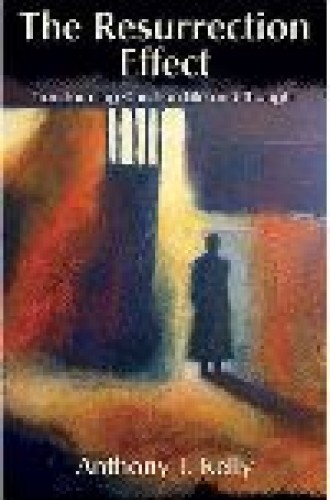The Resurrection Effect: Transforming Christian Life and Thought
The college where I teach is located in a small valley at the southernmost reaches of the Appalachian Mountains. In the morning, particularly in the late autumn and winter, the mountains are sometimes veiled in a thick fog that limits one’s range of vision to a few campus buildings and gives them the appearance of being lost among the clouds. It is easy to forget, during a busy workday, that the mountains are even there. But when the fog eventually lifts, they command fresh attention with their uncanny grandeur and encompassing beauty, and more so for having been temporarily obscured from view. Their sudden appearance disrupts the normal flow of one’s perceptions, intruding upon and unsettling what is, sometimes well into the afternoon, a familiar horizon.
Such occurrences of extraordinary natural beauty or deep human significance are what French philosopher Jean-Luc Marion calls “saturated phenomena.” Major events in human life, like birth, marriage and death; great works of art and literature; the mysterious patterns of the created world; and the intimate face of another person are phenomena so densely layered with meaning and value that they resist the conventional interpretations that we attempt to impose upon them. They elude our immediate grasp and challenge us to see the world in a different way.
The Resurrection Effect is an extended meditation on the resurrection of the crucified Jesus as a unique instance of a saturated phenomenon. Anthony Kelly, a Redemptorist priest who teaches theology at Australian Catholic University, portrays the resurrection as the originating event of the Christian faith, an event that ushers in a radically new awareness of God and God’s transformative presence in the church and the world. “At the price of its authenticity,” he writes, “Christian theology cannot pretend that the resurrection has not happened.”
Kelly draws heavily upon the phenomenology of Marion, the theological aesthetics of Hans Urs von Balthasar, and a number of recent studies of the resurrection (most prominently the work of N. T. Wright) in order to show why God’s raising of Jesus from the dead should register as the focal point of Christian theology and experience. Phenomenology, a philosophical method that seeks to describe the concrete and particular forms of reality as they pre sent themselves to consciousness, lends support to theological reflection on the resurrection by fostering the contemplative openness through which Christians should approach it as the primary datum of faith.
With the aid of phenomenology, Kelly strives to interpret the resurrection in its concrete particularity—as “objective happening” and “subjective recognition,” a supernatural event that is primordially “given” to faith and yet irreducible to human understanding. Kelly’s theology is at times more schematic than systematic, resting on bold claims about the centrality of the resurrection without showing how this insight might require a decisive shift in theological understanding of such matters as the incarnation or the cross. Yet his stated goal is to portray the resurrection not principally as a systematic doctrine but as an elusive gift, a divinely creative action that “exceeds all efforts to express it.”
The resurrection is also an aesthetic phenomenon, a glorious display of the form of God that compels our participation in the glory of the divine life and that permeates, however subtly, the whole of Christian life and thought. Artistic and literary creativity, in Kelly’s view, is integral to resurrection faith. “When faith is met with the phenomenon of this world-transforming event,” Kelly writes, “only an artistically conscious faith can appropriately respond to it by devising a form expressive of what originally disrupted all mundane forms of expression.”
The early Christian experience of the risen Christ is communicated through scripture and tradition. New Testament rhetoric about the resurrection exhibits a tension between light and darkness, presence and absence, eschatological fulfillment and hopeful expectation of what is still to come. The resurrection is a multidimensional event that announces Christ’s victory over the powers of violence, oppression and death; reveals the trinitarian form of God in the Father’s gift of the Son and the outpouring of the Spirit in the sacramental life of the church; and anticipates the eschatological future of humanity.
Kelly’s theology is utterly orthodox in its language, but not in a defensive or mean-spirited way. The strongly confessional tone of his writing, much in the same vein as his previous work, Eschatology and Hope, is also dialogical. Hence, Kelly’s penultimate chapter traces the extensions of the “resurrection effect” in contemporary global consciousness. The meaning of the central mystery of the Christian faith unfolds through a sustained theological engagement not only with philosophy but also with secular politics, contemporary science and other religious traditions. The universal scope of Christ’s victory over the powers of the world lays the theological foundation for an inclusive global ethic of peace, reconciliation, justice, ecological responsibility, solidarity with the oppressed and commitment to human rights.
A critic who is justifiably concerned that Christians are losing distinctiveness in a religiously pluralistic society may charge that such language betrays too much of a reliance on the ideals of secular democracy and modernity. Yet for Kelly these ideals and their manifold realizations in human history are precisely the consequence of the world-transforming impact of the resurrection. Both Christians and non-Christians may engage in resurrectional praxis in public contexts in which faith in the resurrection is not explicitly articulated. The promise of what Kelly aptly dubs “inter-hope dialogue” between members of different religious traditions is that it keeps in sight the common future of humanity, which is already manifest in the figure of the risen Jesus. As Kelly insists, Christ relativizes all cultures, even Christian ones. “He has risen beyond the containment of any culture or any one stage of history, to be the light of the world in its entirety.” A different horizon indeed.




